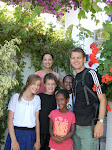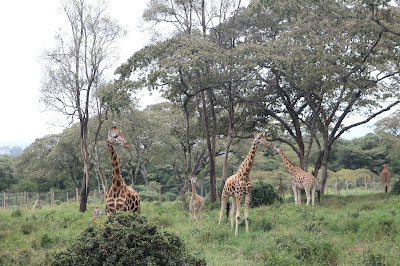and tropical here, similar to Hawaii. We stayed at a fun all-inclusive resort called the Voyager and spent four days relaxing, swimming, running on the beach, eating from the huge buffet and enjoying nightly entertainment like live Kenyan music and acrobatic shows. Today we head home, a 34-hour journey that includes five separate flights. I'm glad we're going into it fully rested.
 |
| So man places to relax here -- aaaaaah... |
We're still processing all we learned and experienced during this trip, but I'll share a few quick reflections while they are on my mind:
* To live in Africa (or probably most developing countries) is to experience the world's ecological threats first-hand. This has been weighing on me since the first day we disembarked in Addis Ababa and again in Nairobi. The air pollution in these cities is horrific. One can barely take a breath because of all smog from the congested, high-polluting cars and trucks combined with the constant burning of trash. Our family has been very healthy on this trip (thank goodness) but our sickest moments have occurred while stuck in city traffic with car windows open. This made me very thankful for California's high standards on air pollution, but also cognizant that millions of people breathe oppressively polluted air every day. And I am not blaming them because I believe Americans are still the #1 polluters in the world thanks to our excessive use of fossil fuels, so I take responsibility as well. Our future does not look good unless we band together and make some significant changes.
* Related to the above, Ethiopia and Kenya have a serious problem with water. Not only is clean, potable water unavailable to so many rural dwellers, but it's even more scarce in the cities. Everyone in the city buys bottled water to drink, and no, there's no recycling of all those plastic bottles here. Every one goes into the trash. Additionally, water to bathe or wash clothing is intermittent due to lack of rain to fill essential reservoirs. Those who can afford it purchase large cisterns to store city water when it's working so they'll have some water to use during the shut-off days, but this is not a workable long-term solution. I did not meet one Ethiopian or Kenyan who uses a clothes washer, for instance, because washing machines use a lot of water and need a certain amount of water pressure. Instead, people boil water and wash clothing by hand in a tub and then hang everything to dry. Same thing for dish-washing. You can imagine how much time this takes, and that's just one example. I've heard it said that water will become the most precious resource on earth as global warming advances, and now I see why that will be the case.
* On a more upbeat note: We could learn a lot about families and parenting from Kenyans and Ethiopians. One thing our family appreciated during our various travels was observing the very high value placed on marriage, children and the extended family. Everywhere you go, you see couples enjoying time together, dads lovingly carrying their children, mothers laughing and playing with their kids, older people being cared for by their children and grandchildren. Etc etc. We even learned some interesting customs of how the dowry is still in effect in Ethiopian and Kenya -- not as an oppressive tool but as a way to ensure the entire family is included in the union of two people. I know that will get some dander up among my U.S. friends, but I don't have space to elaborate so you'll just have to ask me about this later. I'll just tantalize you by saying the dowry negotiations involve lots of goats and cows and lots of kissing-up by the male suitor!
* But wait, feminists among you, please note that I did a running poll of Kenyan working women and they unanimously told me women and men get paid equally here and have equal access to jobs. Their mouths dropped when I told them that's not the case in the U.S.! I found the rate of working women to be very high, perhaps in part because the cost of childcare (i.e. "house help") is quite manageable.
Alright, there are a few droplets from my ocean of thoughts and impressions in Africa. If you've traveled to a very different culture, I'd love to hear from you sometime about things you noticed and appreciated or struggled to accept. This, to me, is the purpose of traveling: to see and experience new things, of course, but also to try to step into the shoes of another people and culture without preconceptions or biases. It's the most challenging and delightful task we have as citizens of the world, don't you think?






































